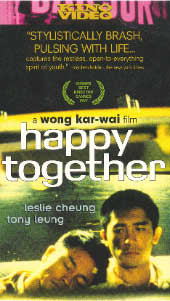Happy Together

Reviewed by YTSL
Confession: I had never heard of the Argentine
novelist, Manuel Puig, until I started reading about the Shanghai-born Hong
Kong-based moviemaker, Wong Kar Wai. Apparently, Puig has a way of telling
a story with all the pieces jumbled up that Wong admires. Supposedly,
the latter's HAPPY TOGETHER, a movie which is indeed set in Argentina for
the most part, is "loosely, almost diaphanously based on" the former's "The
Buenos Aires Affair". This may well be so. But not having read
it, I don't know.

What I do feel is that, ironically enough, HAPPY TOGETHER is by far the
most focused, straightforward and linear Wong Kar Wai film I have seen (and
I have at this point viewed all of his released works bar for his first directorial
effort, "As Tears Go By"). Not unrelatedly, that which is still only
the sixth production that Wong helmed also appears to be his most modest
and pared-down work. Interestingly, it has been revealed that the movie,
which currently is approximately 98 minutes in length, originally clocked
in at three hours (In the process of its being cut down into the final product,
a character played by singer Shirley Kwan got entirely excised from the story).
And although it did take longer to film than expected (four months rather
than six weeks), we are hardly talking about the kind of time (two years)
expanded on making the movie as occurred with his seminal "Ashes of Time".

All in all, HAPPY TOGETHER feels like a small, personal film. Ground
down to its essence, this 1997 international awards winner centers around
two Hong Kongers who are (temporarily) exiled in Argentina, their on-off
emotional and physical relations with -- plus its influence and effects on
-- the other. The responsible and outwardly stoic but internally wretched
Lai Yiu-Fai is portrayed by Tony Leung Chiu-Wai (who deservedly won a best
actor award for his performance in Hong Kong and apparently only lost out
the best actor award by a vote at the 1997 Cannes Film Festival). The
reckless and narcissistic yet emotionally -- as well as physically -- needy
Ho Po-Wing is played by Leslie Cheung (who was also nominated for best actor
for this performance).

The movie (which won Wong Kar Wai the best director award at Cannes; and
cinematographer Christopher Doyle a Taiwanese Golden Horse award) begins
with a scene of Yiu-Fai and Po-Wing having sex. Shortly after, on
an aborted trip to see Iguazu Falls, they quarrel and break up. Yiu-Fai
suspects -- actually, knows -- that at some point, Po-Wing will come to him
and ask to "start over" once again. In the meantime, he gets tormented
by watching Po-Wing prostituting himself for a living and going with his
clients into such as the tango club cum bar for which Yiu-Fai works as a
doorman. Before too long, Po-Wing is indeed back in Yiu-Fai's apartment
and life. At some point in the film, Yiu-Fai quits his doorman job
and goes to work in the kitchen of a restaurant. One of the workers
there is a young Taiwanese man (played by Chang Chen) who is out to see the
world, temporarily stopping in Buenos Aires to make enough money before proceeding
with his travel which now has taken him effectively halfway around the globe
from his native land...

One of the amazing things for me about Wong Kar Wai's films is that however
quirky (maybe even downright weird), flawed, frustrating or enigmatic and
philosophically archetypal are the characters in them, they also do seem
so believable and actually real. Even if you don't personally know
people like them (yet), you can expect -- even if you don't want to do so!
-- to come across someone like one of them at some point in your life.
This is the case with Yiu-Fai (who, incidentally, is named after one of Doyle's
assistants!), Po-Wing (who got his name from the other assistant cameraman!)
and Chang (whose character's name is the same as that of the actor who plays
him, a quite common occurrence in Hong Kong movies!).

Still, this is not the main reason for my finding so much worth in Wong
Kar Wai's distinctive (body of) work. Rather, that lies in there being
scattered throughout them those wonderful thoughtful musings, which initially
seem like throw-away asides, that actually take some moments for my brain
to take in and process (at which point, I have to rewind the tape and read
-- I'm subtitle dependent -- them again). Then there's Christopher
Doyle's stunning and often sensuous cinematography (In HAPPY TOGETHER, the
Iguazu Falls shots were amazing; ditto that of the lighthouse at "the bottom
of the world"; the close-ups of bodies being held in embrace as they did
the tango or just stood still, etc. were like slow moving paintings (as opposed
to pictures)). These two elements alone make this film a fulfilling
intellectual as well as sensory treat of a very high order. As with
other Wong Kar Wai productions though, you know that there is so much more
that I have not discussed and which is there for the viewer to individually
discover.
My rating for the film: 9.








